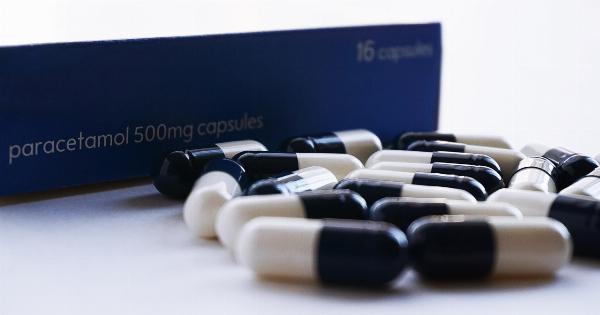Rheumatoid arthritis (RA) is a chronic inflammatory disease that affects the joints, causing pain, stiffness, and swelling.
While the exact cause of RA is unknown, there are certain risk factors that may increase a person’s risk of developing the disease, such as genetics, smoking, and obesity. In addition to these factors, research has also shown that certain medications may heighten the risk of developing rheumatoid arthritis.
Corticosteroids
Corticosteroids, also known as steroids, are commonly used to reduce inflammation and pain in individuals with RA. These medications work by suppressing the immune system, which helps to reduce inflammation in the joints.
However, prolonged use of corticosteroids may increase the risk of developing RA. A study published in the journal Arthritis & Rheumatology found that individuals who used corticosteroids for over six months had a higher risk of developing RA compared to those who did not use the medication.
Furthermore, the risk increased with higher doses of corticosteroids.
Nonsteroidal Anti-Inflammatory Drugs (NSAIDs)
Nonsteroidal anti-inflammatory drugs (NSAIDs) are commonly used to relieve pain and inflammation in individuals with RA. However, research has linked the use of NSAIDs with an increased risk of developing RA.
A study published in the Annals of the Rheumatic Diseases found that individuals who used NSAIDs for over five years had a higher risk of developing RA compared to those who did not use these medications. The researchers suggest that the long-term use of NSAIDs may affect the immune system, leading to an increased risk of RA.
Proton Pump Inhibitors (PPIs)
Proton pump inhibitors (PPIs) are medications commonly used for the treatment of gastroesophageal reflux disease (GERD) and other gastrointestinal conditions. However, recent research has linked the use of PPIs with an increased risk of developing RA.
A study published in the Journal of Rheumatology found that individuals who used PPIs for over six months had a higher risk of developing RA compared to those who did not use the medication. While the exact mechanism behind this association is not yet clear, researchers suggest that PPIs may affect the immune system, leading to an increased risk of RA.
Statins
Statins are medications commonly used to lower cholesterol levels and reduce the risk of heart disease. However, studies have shown that the use of statins may be associated with an increased risk of developing RA.
A study published in the journal Arthritis Research & Therapy found that individuals who used statins had a higher risk of developing RA compared to those who did not use the medication. While the exact mechanism behind this association is not yet clear, researchers suggest that statins may affect the immune system, leading to an increased risk of RA.
Antibiotics
Antibiotics are used to treat bacterial infections and are commonly prescribed for a variety of conditions. However, research has linked the use of antibiotics with an increased risk of developing RA.
A study published in the journal Arthritis & Rheumatism found that individuals who had used antibiotics in the year prior to being diagnosed with RA had a higher risk of developing the disease compared to those who did not use these medications. The researchers suggest that antibiotics may trigger an autoimmune response in some people, leading to an increased risk of RA.
Probiotics
Probiotics are live bacteria and yeasts that are beneficial to the digestive system. While probiotics are generally considered safe, research has linked the use of these supplements with an increased risk of developing RA.
A study published in the Journal of Rheumatology found that individuals who had used probiotics had a higher risk of developing RA compared to those who did not use these supplements. While the exact mechanism behind this association is not yet clear, researchers suggest that certain strains of probiotics may trigger an autoimmune response in some people, leading to an increased risk of RA.
Antidepressants
Antidepressants are commonly used to treat depression and other mental health conditions. However, research has linked the use of antidepressants with an increased risk of developing RA.
A study published in the Annals of the Rheumatic Diseases found that individuals who had used antidepressants had a higher risk of developing RA compared to those who did not use the medication. While the exact mechanism behind this association is not yet clear, researchers suggest that antidepressants may affect the immune system, leading to an increased risk of RA.
Antihypertensive Medications
Antihypertensive medications are used to treat high blood pressure and reduce the risk of heart disease. However, research has linked the use of these medications with an increased risk of developing RA.
A study published in the journal PLOS One found that individuals who used antihypertensive medications had a higher risk of developing RA compared to those who did not use the medication. While the exact mechanism behind this association is not yet clear, researchers suggest that these medications may affect the immune system, leading to an increased risk of RA.
Immunomodulators
Immunomodulators are medications that work by modifying the immune system in order to treat autoimmune diseases such as RA. While these medications are often used to treat RA, they may also increase the risk of developing the disease.
A study published in the journal Arthritis & Rheumatology found that individuals who used immunomodulators had a higher risk of developing RA compared to those who did not use these medications. While the exact mechanism behind this association is not yet clear, researchers suggest that the use of immunomodulators may affect the immune system, leading to an increased risk of RA.
Conclusion
The use of certain medications may increase the risk of developing rheumatoid arthritis.
Corticosteroids, NSAIDs, PPIs, statins, antibiotics, probiotics, antidepressants, antihypertensive medications, and immunomodulators have all been linked to an increased risk of RA. While these medications are often used to treat a variety of conditions, it is important to discuss the potential risks and benefits with a healthcare provider before starting any new medication.






























